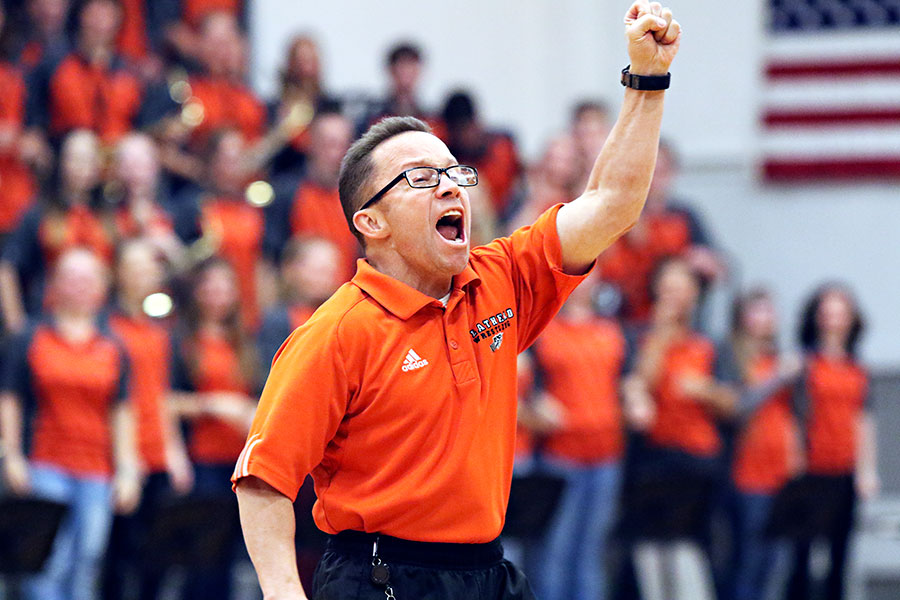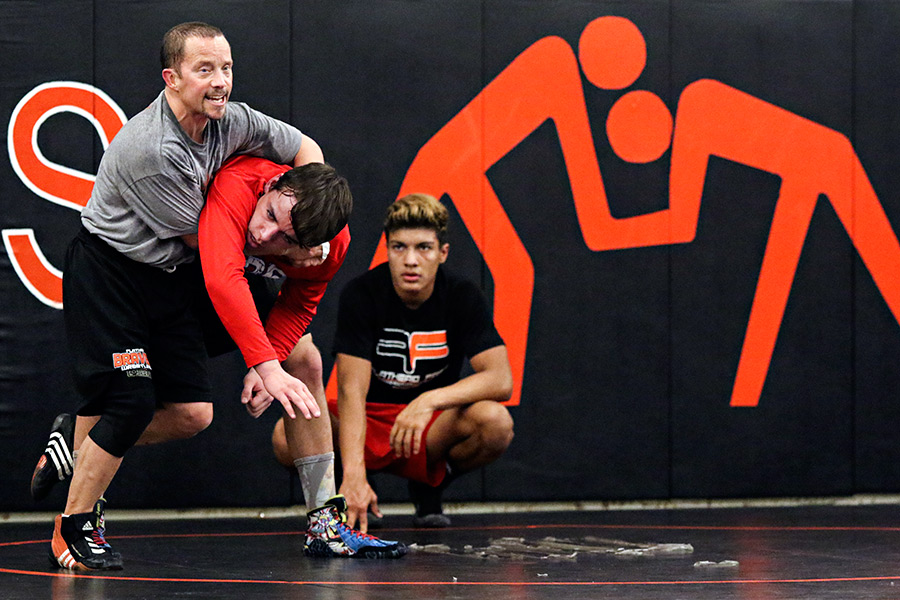The Mayor of Montana Wrestling
Former Brave Brawlers coach Jeff Anderson joins the Legends Wall of Fame, honored for his lifetime contribution to the state's wrestling scene
By Micah Drew
In nine pages of records kept in the Montana High School Association wrestling online archives, Jeff Anderson’s name doesn’t appear once. The closest association one can make with his name is the six years Flathead High School is listed winning Class AA state titles, or his protégé, Jeff Thompson, listed for his state championships as both an athlete and coach.
None of the associated feats would be possible without Anderson, which goes to show that archival records only reveal a modicum (or no part) of any story. His recent induction into the Legends Stadium Wall of Fame, however, pays tribute to a life dedicated to his passion for wrestling — first as a competitor, then for decades as a coach until his retirement in 2020.
Anderson does not cut an imposing figure. A head shorter than average, it’s easy to believe him when he talks about being the smallest wrestler in the lowest weight class for the entirety of his athletic career.
In junior high, Anderson remembers going to the gymnasium with his classmates and being told that they were going to be multi-sport athletes. Due to his diminutive stature, Anderson knew he really only had two options: running and wrestling.
“As a freshman in high school I was 69 pounds, and my weight class was 98,” Anderson said recently from his home in Whitefish. “By my junior year I was 92 pounds but managed to place second at state.”
Anderson, 56, said his coach at the time, Chris Tyree, believed in him enough to set him on the path to success, a path that meant learning how to consistently beat competitors who always had a size advantage.
“I had to become a true student of the sport, and one of my best attributes is technique,” Anderson said. “If you have an idea of what you’re doing and maximize the use of leverage and speed, it can help eliminate the burden of someone else’s extra weight. That’s what I specialized in.”
In 1982, as a senior, Anderson won a state title on the back of an undefeated season and looked for competitive opportunities beyond high school.
Anderson drew the attention of major universities, including the Griz and Bobcats, but demurred, opting to attend Northwest College in Powell, Wyoming instead. A main reason for his choice was that the lowest weight class in the NCAA was 118 pounds. Anderson tipped the scales at a generous 105, making him the smallest high school wrestler in the country to receive a college scholarship.
Nonetheless, Anderson transferred to the University of Montana in 1984 and spent four years wrestling for the Griz.
“Going to that collegiate level is rough, because everyone in the wrestling room is a state champion,” Anderson said. “Me being literally one of, if not the smallest wrestler in the country, it wasn’t easy.”
College didn’t bring a lot of success for Anderson, but he continued to work on his technique, picking up any move or mental edge that could give him an extra inch of advantage over an opponent.
On the national and international stages, however, with a weight class slotted right at his natural weight of 105, Anderson began to make headlines. He won a gold medal at the Junior Pan-American games in Greco-Roman and took the silver in freestyle wrestling.
Over the course of 16 years, Anderson qualified for four consecutive Olympic Trials.
“I will say I kind of considered myself a little bit of a bridesmaid,” Anderson mused. “I was always in that position where I was competing well against the top opposition, but I was never the top guy. But I’ve lost to the best people in the country.”
In his last Olympic Trials in 1996, Anderson was injured in his final match and lost to an opponent who went on to make the Olympic team.
“I was there, but I was just never the very, very best,” he said.
Spending the better part of two decades as a competitive athlete on the national and international scene is impressive on its own, but Anderson was also a high school science teacher and wrestling coach at the same time.
“Days would start at 5 a.m., getting in my conditioning runs and lifting weights, then I went through a day of teaching, got time on the mats while coaching, then do more cardio and come home and do paperwork until 11 or so,” Anderson said. “To me it wasn’t a sacrifice; it was just what I had to do.”

Jeff Thompson, the current head wrestling coach for Flathead, remembers meeting Anderson for the first time as a high school athlete in Great Falls in 1989.
“I met Coach Anderson — and I still call him that after all these years — in [coach Bob] Zadick’s garage,” Thompson said. “I couldn’t believe how tough he was, this little 105-pound guy taking down people twice his weight.”
The Great Falls wrestlers used to leave the school’s wrestling room after practice and reconvene in Zadick’s garage to continue working out. Coach Anderson never missed an extra workout.
“There wasn’t much specializing in sport at that time, but he really opened that door for us,” Thompson said. “We could spend 365 days a year wrestling in that garage and we did.”
“Coach Anderson taught me what it took to be a champion,” Thompson continued. “Even though he was teaching and coaching, he also spent time wrestling with us, drilling with us, running with us and lifting with us.”
After his stint in Great Falls, Anderson heard there was an opening for a science teacher at his alma mater and moved back to the Flathead. He became the wrestling coach for the Braves, serving as the head coach for seven years before stepping down and turning the reins over to Thompson. Anderson continued as the assistant, helping Flathead win six state championships and relishing a role that let him focus more on technique than logistics. Anderson was named the Montana assistant wrestling coach of the year six times, and the national assistant coach of the year once.
“My biggest takeaway from Coach A was to strive for perfection,” Thompson said. “It could make him frustrating to work with sometimes, but he never actually expected to get perfection, but rather always emphasized striving for it — in pursuit of championships or as a teacher or in relationships with a spouse.”
In his retirement, Anderson is capitalizing on his first winter absent from a wrestling room, spending his days skiing on Big Mountain and hiking in Glacier Park with his wife of 15 years.
While he’s enjoying the respite after being “married to the sport” for decades, Anderson doesn’t anticipate he’ll be able to stay away from the sport for long — the people are too good to remain apart from.
“I’ve been coaching for 33 years, and I’ve been able to develop relationships with hundreds of people,” Anderson said. “Between the kids that come through the program, and the coaches I dealt with on the state and national level, that’s been the best part of my career.”
“He really walked the walk,” Thompson said. “Even when it was our main competition, if a coach from another program needed help, Coach Anderson was there. That’s why we gave him the name Mayor.”
“He really was a class act.”